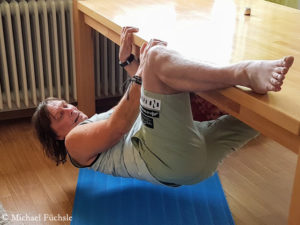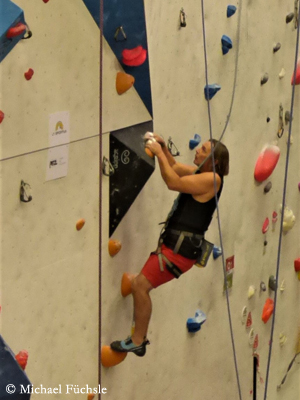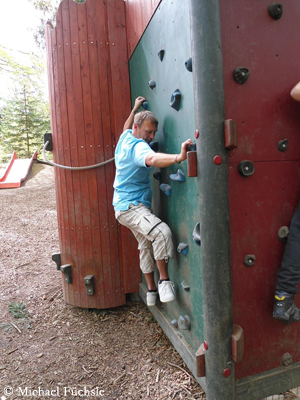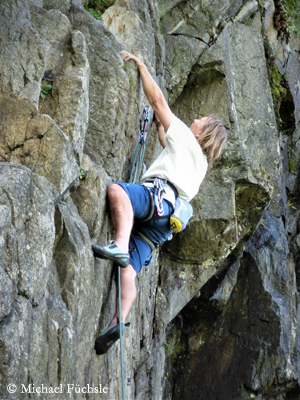Bouldering at the dinner table. Also Michael Füchsle is currently training at home in the small German town of Bobingen near Augsburg. He hopes that the corona crisis will soon be over and that he can leave the exile in his own four walls. “Climbing is my purpose in life”, the 53-year-old tells me. “I cannot live without it. Next to my girlfriend, climbing is the most important thing.”
After all, Michael also earns his living with it. “I can’t make big leaps, but it’s enough to live on.” Füchsle is no ordinary professional, but a paraclimber, a climber with a handicap, with an artificial bowel outlet, to be precise, a so-called stoma. In addition, he is suffering from a neurological disease that leads to deafness and paralysis in parts of his arms and legs.
Career end? Maybe
Nevertheless Michael trains five to six times a week. In summer 2019 he started in Briancon in the south of France for the German Alpine Club (DAV) at the Paraclimbing World Championships and finished 14th in his competition class. Not his best Championschips result, in 2016 in Paris Füchsle had finished fifth, in 2017 even second in the overall World Cup.
Ever since he completed half a century of life, he has been flirting with the retirement from competitive sports, says Michael says, but he has done it rather half-heartedly: “I have been announcing regularly for three years that I want to withdraw. With 80-percent probability this year will really be my last as competitive paraclimber.”
“Professional” aged 14
Füchsle discovered his passion for climbing early on. At the age of 14 he told his parents that he wanted to finish school and become a professional climber. He earned his first money with a climbing guide for the rocks near the village of Konstein in the Altmühltal Nature Park. “If my parents didn’t support me, I would never have made ends meet.”
But by and by, Michael not only became a better and better climber, but was also able to stay afloat financially: by competing, giving lectures, writing magazine articles or other climbing guides. He achieved some first ascents in the tenth and ninth degree of difficulty.
Between life and death
At the age of 18, Füchsle was diagnosed with a chronic bowel inflammation, but this did not prevent him from climbing on. Until the night between 28 and 29 September 2005, when Michael entered a hospital with severe abdominal pain. The diagnosis was devastating: intestinal rupture, massive sepsis.
Three times he was operated, for 16 days he was in a coma and was given artificial respiration. When Füchsle awoke from his coma, he not only had an artificial bowel outlet, but was paralysed from the neck down. The doctors explained that he had to spend the rest of his life in a wheelchair.
With ambition and hard fighting
The then 38-year-old did not want to accept this fate, but threw himself into physiotherapy and strength training. Two years after the operation, he was able again to walk several meters. “With ambition and hard fighting you can achieve anything,” says Michael. “It’s part of my nature, otherwise I wouldn’t have been able to get out of the wheelchair.”
His girlfriend Marion finally made sure that Füchsle found his way back to climbing in 2012. “We were in the Bavarian Forest National Park, there was a small artificial climbing wall. My girlfriend said: ‘Why don’t you give it a try?’ I had taken a break for years, two moves and my forearm tightened.” But his ambition was aroused again. In 2015, Füchsle took part in his first paraclimbing competition.
Not on expedition
When climbing, he wears a bandage over the artificial bowel outlet as well as a plastic protection because the harness runs exactly over the stoma. “I should avoid strongly overhanging rocks or shelters, because it is possible that the stoma will be squeezed out if I stretch it too much”, explains Michael. “In that case an immediate emergency operation would be necessary.”
He thus moves along the narrow ridge that his handicap dictates. “Expeditions would not be possible in terms of health, nor would multi-pitch routes,” says the paraclimber. “I have a small intestinal stoma. The small intestine is always working, so I have to empty the bag every half to three-quarters of an hour.”
His motivation is unbroken. “I have many goals”, reveals Michael Füchsle. “At some point I would like to do another difficult rock project – two weeks on the rock and then a first ascent.”. But now it means for him, as for all other climbers, to wait: for the end of the corona crisis.






